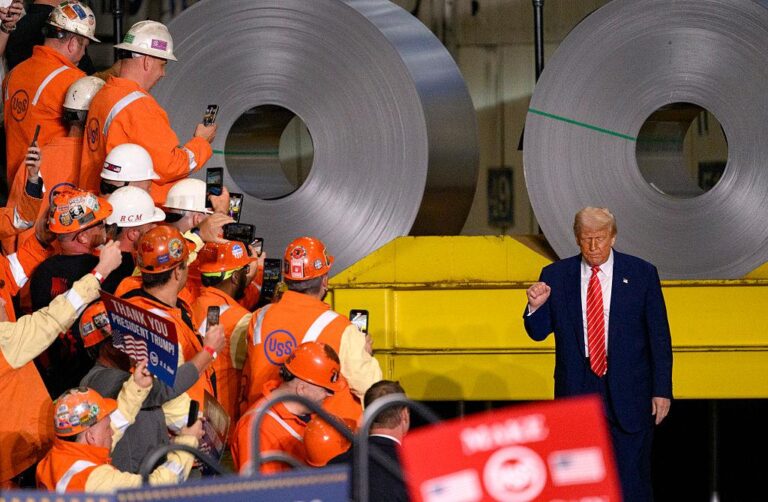The United States has opted not to raise tariffs on steel and aluminum imports from the United Kingdom, signaling a thaw in trade relations as both nations pursue a swift bilateral trade agreement. The move, announced Tuesday, underscores Washington’s willingness to ease tensions and foster closer economic ties with its closest ally amid ongoing global market uncertainties. The decision comes as UK officials ramp up efforts to finalize a deal that could enhance transatlantic commerce and strengthen supply chains.
US Holds Off on Raising UK Steel and Aluminum Tariffs Amid Trade Negotiations
The United States has decided to hold off on increasing tariffs on steel and aluminum imports from the United Kingdom as diplomatic efforts continue towards forging a comprehensive trade agreement between the two nations. Sources suggest that this pause is a strategic move to maintain momentum in the ongoing negotiations, signaling a willingness to find common ground without imposing further economic barriers. Both countries are reportedly aiming to finalize a deal that not only addresses tariffs but also strengthens broader economic ties post-Brexit.
Key aspects currently under discussion include:
- Tariff exemptions for certain steel and aluminum products
- Alignment on regulatory standards
- Enhanced investment protections
- Focused cooperation to boost bilateral trade volume
| Tariff Status | US Position | UK Response |
|---|---|---|
| Steel | Temporary freeze on hikes | Welcomed pause; seeking removal |
| Aluminum | Maintained current rates | Committed to negotiations |
| Trade Talks | Ongoing with priority | Aiming for swift conclusion |
Implications for Transatlantic Relations and Industry Impact Analysis
The US decision to forgo escalating tariffs on UK steel and aluminum marks a significant pivot in transatlantic economic dynamics. This move not only alleviates immediate financial pressure on British manufacturers but also signals a renewed commitment toward strengthening the post-Brexit trade relationship. Analysts suggest this gesture serves as a strategic olive branch, fostering trust and expediting negotiations for a comprehensive trade agreement that could reshape supply chains and market access on both sides of the Atlantic.
Industry stakeholders anticipate several key impacts:
- Stimulated UK steel and aluminum production due to improved export conditions.
- Enhanced competitiveness against global rivals, particularly in EU and Asian markets.
- Potential for increased cross-border investments given reduced protectionist barriers.
| Sector | Short-Term Impact | Long-Term Outlook |
|---|---|---|
| Steel Manufacturing | Price stabilization | Growth in export volume |
| Aluminum Industry | Improved supply chain resilience | Expanded market opportunities |
| Automotive | Reduced input costs | Boost in production efficiency |
Strategic Recommendations for Stakeholders Ahead of Potential Trade Agreement
As the United States pauses on tariff hikes for UK steel and aluminum, stakeholders must seize this moment to prepare for the evolving trade landscape. To capitalize on potential agreements, businesses should prioritize building agile supply chains that can swiftly adapt to tariff changes, reducing exposure to sudden trade barriers. Policymakers and industry leaders are encouraged to actively engage in dialogue with trade representatives to align strategies and ensure mutual benefits are secured in any forthcoming deal.
Key recommendations include:
- Enhancing transparency in sourcing and manufacturing processes to meet regulatory compliance.
- Investing in technology that improves trade documentation and customs clearance speed.
- Collaborating with financial institutions to manage risks related to currency fluctuations amid trade uncertainty.
- Proactively monitoring policy developments to anticipate shifts in tariff structures or quotas.
| Stakeholder | Strategic Action | Expected Benefit |
|---|---|---|
| Manufacturers | Optimize supply chain resilience | Reduced disruption risk |
| Exporters | Strengthen compliance protocols | Faster clearance and lower costs |
| Policy Makers | Facilitate stakeholder engagement | Informed, balanced agreements |
Wrapping Up
As the United States opts against increasing tariffs on UK steel and aluminum, both nations signal a willingness to accelerate negotiations toward a comprehensive trade agreement. This development underscores a shared interest in strengthening economic ties amid a shifting global trade landscape. Stakeholders will be watching closely as subsequent discussions unfold, with the prospect of a swift deal offering potential benefits for industries on both sides of the Atlantic.




